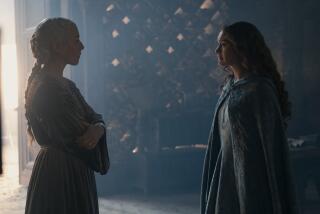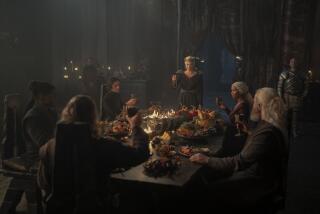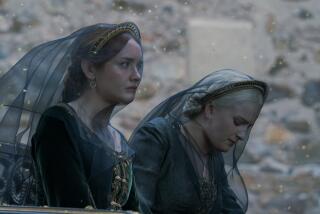How ‘Game of Thrones’ wronged its female characters in the series finale
“Game of Thrones” will always be remembered for the strength and complexity of its female characters, flawed and fascinating women like Cersei Lannister and Daenerys Targaryen, who were beautifully portrayed even when the writing by showrunners D.B Weiss and David Benioff failed them.
And Sunday’s series finale, “The Iron Throne,” did just that. The 80-minute episode illustrated in microcosm the gender blind spots that have bedeviled the show from its beginning, unfolding almost completely from the perspective of two men, Tyrion and Jon, while pushing its remaining female characters — Daenerys, Arya, Sansa and Brienne — to the sidelines. (Spoilers ahead.)
In the end Bran, a young man with few accomplishments other than his impressively creepy stare, ascends to power and becomes the Ruler of the Seven Kingdoms … make that Six Kingdoms: Sansa declares independence for her people, is met with strangely little resistance and becomes Queen in the North, in what feels like a bitter consolation prize for the women of Westeros.
Fans have found many reasons to object to “The Iron Throne,” from Jon’s exile to Castle Black to a pair of anachronistic plastic water bottles. But here is a look at how the final episode of “Game of Thrones” — a series that has had just one female director and two female writers in eight seasons — wronged its remarkable women.
FULL COVERAGE: The final season of ‘Game of Thrones’ »
Killing off the greatest villain ever with … a bunch of bricks
So technically she died in last week’s episode, but “The Iron Throne” confirmed the galling truth: Cersei Lannister, the most delightfully wicked character in Westeros — and possibly all of television history — was killed not by a fire-breathing dragon or a girl with a taste for revenge, but by a lousy pile of bricks. This, after a season in which she had virtually nothing to do but look out from balconies while sipping wine and occasionally clutching her stomach in a soapy pregnancy storyline that never went anywhere. The show spent more time watching the Clegane brothers murder each other in gruesome fashion than it did bringing her story to a fitting conclusion. Love her or hate her, Cersei deserved more.
Jon mansplains Daenerys’ motivation
What made Daenerys turn from the Breaker of Chains into the Mad Queen in seemingly less time than it takes to braid her hair? Some of us would like to know! A concerted effort to portray Dany’s point of view might have been useful. Instead, we never even glimpsed her face in “The Bells” after she decided to ignore Cersei’s surrender and firebomb King’s Landing. And in “The Iron Throne,” Jon does most of the explaining for her in a long conversation with Tyrion that’s heavy on expository dialogue. “She saw her friend beheaded. She saw her dragons shot out of the sky!” Jon says. OK! But it would have been a lot more powerful hearing this from Daenerys herself.
ALSO: ‘Game of Thrones’ series finale ends more with an exhale than a bang »
Daenerys isn’t just a genocidal maniac, she’s also bad at math
Jon tricks his aunt/lover Daenerys into a kiss and then stabs her like a sucker. Her heartbreaking death feels even more tragic because in the moment she seems like the Dany of old, not the despotic maniac who laid waste to King’s Landing. Alas, to drive this point home, she tells him not once, but twice, that as a girl she couldn’t count to 20, much less imagine a throne made out of a thousand swords. There were many other ways to remind viewers of how innocent and wide-eyed Dany used to be — thousands, probably, but I can’t count that high!
ALSO: The North remembers: In Northern Ireland, ‘Game of Thrones’ leaves a lasting legacy »
Bran wins the Iron Throne because he has the “best story.” Have you met his sisters?
When Tyrion emerges from his cell — after a week? A month? A year? — to stand before the privy council, he makes the case that Bran should claim the Iron Throne because “there’s nothing in the world more powerful than a good story. … And who has a better story than Bran the Broken?”
I can think of a few people! Starting with his sisters, Arya and Sansa, who both evolved powerfully over the course of eight seasons — Arya from a doe-eyed little moppet to a ruthless assassin with face-swapping abilities (unused in Season 8), Sansa from a spoiled brat to a wise, cunning and formidable leader who fed her rapist to his dogs.
Bran the character never amounted to much more than some supernatural abilities of questionable value (what was the point of warging again?) and a goofy nickname (the Three-Eyed Raven). If Bran’s story was so compelling, then how is it that no one was really bothered when he didn’t even appear in Season 5? Bran is the equivalent of the guy at a party who won’t stop talking about his dreams. Meanwhile Arya is the one who saved him — and all of humanity! — from the Night King. Do stories get better than that?
Ser Brienne’s transformation into lovesick teenager
There’s a strong case to be made that no female character got it worse in the final run of “Game of Thrones” than Ser Brienne of Tarth. For seven seasons she was defined by her fierce independence and unwillingness to conform, but then she lost her virginity to Jaime and was reduced to tearfully begging him not to return to King’s Landing — a moment so out of character that it felt like a betrayal. Then, in her last significant act in the series, Brienne, blinking back tears, wordlessly writes Jaime’s biography — rather than her own — into the history books. I can’t think of a more blatant example of a woman being used to service a man’s storyline than this.
ALSO: ‘Game of Thrones’ love affair with sadistic audience manipulation, and why we keep watching »
The last word in “Game of Thrones” is “brothels.” Literally.
You would think that a show that’s been criticized for gratuitous “sexposition” and treating the naked female body like set dressing would be more self-aware than to end with a jokey conversation about brothels. But you’d be wrong! In the closing moments of the finale, Tyrion convenes the Small Council to begin the job of ruling the Six Kingdoms. Bronn, newly appointed master of coin, suggests rebuilding the city’s brothels and a debate briefly follows, leading Tyrion to share an anecdote about the time he “brought a jackass and a honeycomb into a brothel.” What’s meant to play as a moment of levity after so much murder and fascism instead feels tone-deaf. The wheel may be broken, but the sex trade is alive and well!
Follow me @MeredithBlake
More to Read
The complete guide to home viewing
Get Screen Gab for everything about the TV shows and streaming movies everyone’s talking about.
You may occasionally receive promotional content from the Los Angeles Times.






